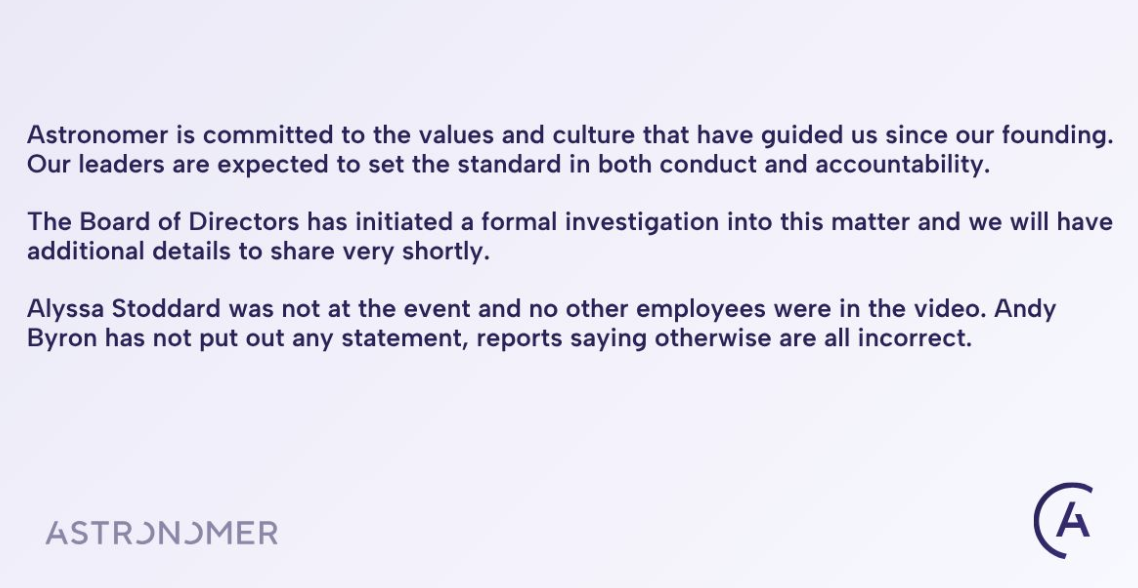The Coldplay CEO Scandal: A Crisis PR Case Study for Corporate America
The Coldplay CEO cheating scandal has officially broken the internet—and corporate America's collective brain along with it.
The CEO of Astronomer, Andy Byron, was the #1 trending search on Google, with over 2 million+ queries in less than 24 hours on Thursday, July 17. Not because of a product launch or funding round, but because of a viral cheating scandal that played out during a Coldplay concert and imploded his personal and professional credibility in real time.
When I saw the video on TikTok, it had been up for about 14 hours and had garnered 36.5 million views. Today? It's well over 98 million. But I get it, I mean—I watched it three times just trying to process what I was seeing. It's not every day that a corporate meltdown unfolds to a Coldplay soundtrack.
The Coldplay CEO cheating scandal isn't just entertainment, it's a masterclass in how NOT to handle a crisis.
Astronomer has since posted a company statement on LinkedIn. And let me tell you, it says almost nothing. The post confirms that the Board of Directors has launched a formal investigation, denies involvement by other employees, and claims Andy Byron has tendered his resignation.
Astronomer's official message is nearly as hollow. It's a vague holding pattern wrapped in corporate-speak. There's no direct acknowledgment of what happened, no empathy, no leadership tone—just a desperate attempt to hit "pause" on public outrage.
But beyond the spectacle that has taken over the internet in a way I haven't seen a story do in a long time, the Coldplay CEO cheating scandal offers a powerful blueprint for corporate America to revisit three essential truths:
Every company needs a crisis communication plan.
Public statements must be thoughtful, clear, and accountable.
Scandals like this resonate because they expose the rot in corporate culture, especially around power, privilege, and performance.
Let's break it down.
1. Every Company Needs a Crisis Plan
We live in a time when a single moment—captured at a concert, on a plane, in an elevator—can upend a brand in seconds. Crisis communications isn't a "nice to have" anymore. It's a non-negotiable.
The harsh reality? Only 49% of U.S. companies have a formal crisis communication plan, according to a 2023 Capterra study. That means more than half of businesses are flying blind when disaster strikes. And with around 40-60% of small businesses never reopening following a crisis…the stakes couldn't be higher.
Not everyone has an Olivia Pope à la Scandal to swoop in with a perfectly crafted strategy and a team of crisis gladiators. Most companies are stuck with whoever happens to be in the office when their world implodes on social media. That's a terrifying thought when you consider that delay or hesitation in crisis response can seriously damage an organization's reputation and business.
Whether you're a startup CEO, a legacy brand CMO, or an HR director, ask yourself right now:
If something exploded online, who responds?
What's the chain of command?
Do we have templates for statements?
Do we know our tone of voice in crisis mode?
Have we trained leaders in how to own their mistakes in public?
Astronomer clearly didn't have a crisis communications plan. The company's initial response came across as reluctant damage control rather than decisive leadership. There was no consistent message. No internal cohesion. Just a lot of corporate wallpaper trying to cover a gaping hole.
The window for damage control is shrinking fast. Since news now travels at the speed of light, silence gives issues time to percolate and ultimately boil over. The longer the delay, the more widespread the damage, and the longer it takes to recover. What used to be a 24-hour news cycle is now measured in minutes on TikTok.
Had they done the prep work, there could have been:
A holding statement within the first 2 hours
A unified message to internal teams
A clear apology that outlined next steps and support for affected staff
Leadership coaching to prevent compounding the issue
Instead, we got a reactive mess. And the internet does not forget. The Coldplay CEO cheating scandal proves that in the age of viral TikTok scandals and high-profile workplace misconduct, crisis PR plans aren't just essential—they're survival tools.
2. Astronomer's Statement Is a Case Study in Saying Nothing
Let's talk about the official company response: "The Board of Directors has initiated a formal investigation into this matter and we will have additional details to share very shortly... Andy Byron has not put out any statement, reports saying otherwise are all incorrect."
Here's why this kind of language falls flat:
It offers zero empathy: There's no mention of trust, leadership, or the many people, internally and externally, who feel betrayed or confused. There's no sense of urgency, care, or ownership.
It denies without clarifying: If the viral video isn't Andy Byron, just say so. If it is, then admit that much and commit to a real review. Vague denials don't calm speculation, they fuel it.
It ducks accountability:. Saying the board is investigating is fine. But people want to know what values were violated, who is responsible, and how the company will respond. Deflecting, denying, and delaying isn't leadership.
Compare it to great corporate responses, like Airbnb's handling of discrimination claims or Patagonia's founder donating his company to environmental causes. The best statements reflect values in action.
3. Why This Scandal Struck a Nerve in Corporate America
So why are millions of people glued to this story? Because the Coldplay CEO cheating scandal isn't just a cheating scandal. It's a mirror.
It reflects the tension in so many workplaces between performance and principle. Between who gets protected and who gets punished. Between what HR says it stands for and what it actually enforces.
Andy Byron is the CEO. The woman he was allegedly filmed with? The Chief People Officer. Let that sink in.
This wasn't just a lapse in judgment. It was a collision of power, proximity, and policy. The very person responsible for upholding ethical workplace culture was allegedly complicit. For many in corporate America, this moment is infuriatingly familiar: the rules only apply to some.
The numbers tell the story: Only 51% of employees trust their CEOs, according to Edelman research, while a staggering 86% of executives believe they have high trust with employees, but only 60% of workers feel that trust is reciprocal. This massive disconnect reveals how out of touch leadership is with their workforce's perceptions.
When leadership behaves badly and HR protects them, it sends a chilling message to everyone else. That message is this: Your values are optional if you're high enough on the org chart.
If you work in Corporate America, I’m sure I don’t have to explain to you that workplace misconduct is real. I’m certain you’ve either experienced it firsthand or you’ve seen it happen to someone else. The data around workplace misconduct doesn’t lie:
52% of employees face workplace harassment, yet only 58% of harassment and misconduct issues were actually reported in 2023
Up to 72% of workplace sexual assault victims don't report incidents, fearing career retaliation or having little faith in the claims process
24% of employees have left companies specifically because they didn't feel trusted by leadership
1 in 20 job candidates screened in 2024 showed warning signs of workplace misconduct
That's why the Coldplay CEO cheating scandal isn't fading. It's not just about infidelity. It's about:
Abuse of power
Hypocrisy in leadership
The broken trust between employers and employees
The double standards in HR crisis management
This scandal hits particularly hard because it involves the Chief People Officer—the person whose job it is to create safe, ethical workplace cultures. When the very people responsible for protecting employees become complicit in misconduct, it confirms every employee's worst suspicions about corporate hypocrisy.
As someone who's worked with brands through both crisis and comeback stories, I can tell you this much: people are tired of "performative integrity." The kind that shows up in LinkedIn posts but not in real-life decisions. And they're not alone—this Byron scandal follows other high-profile cases like Stefan Kaufmann's abrupt resignation as CEO of Olympus in October 2024 following personal misconduct revelations.
Final Thoughts: A Wake-Up Call for Leaders
The Coldplay CEO cheating scandal will fade eventually. The memes will slow down. The Google searches will drop. But the lessons should stick:
If you're a company leader, get your crisis communication plan in place now.
If you're issuing a public statement, make it meaningful. Say something real.
If you're in HR or People Ops, remember, your job is to protect everyone, not just the C-suite.
Corporate America is watching. Employees are watching. And in 2025, leadership isn't about being spotless. It's about being human and accountable.
Don't let your next corporate ethics disaster turn into a trending TikTok. Plan better. Respond smarter. And here's a free tip: if you're going to have a career-ending moment of poor judgment, maybe don't do it at a venue where 50,000 people paid $200+ to watch a British band make everything glow with LED wristbands. Turns out, those aren't just for "A Sky Full of Stars"—they're apparently perfect lighting for filming your professional downfall in 4K.


